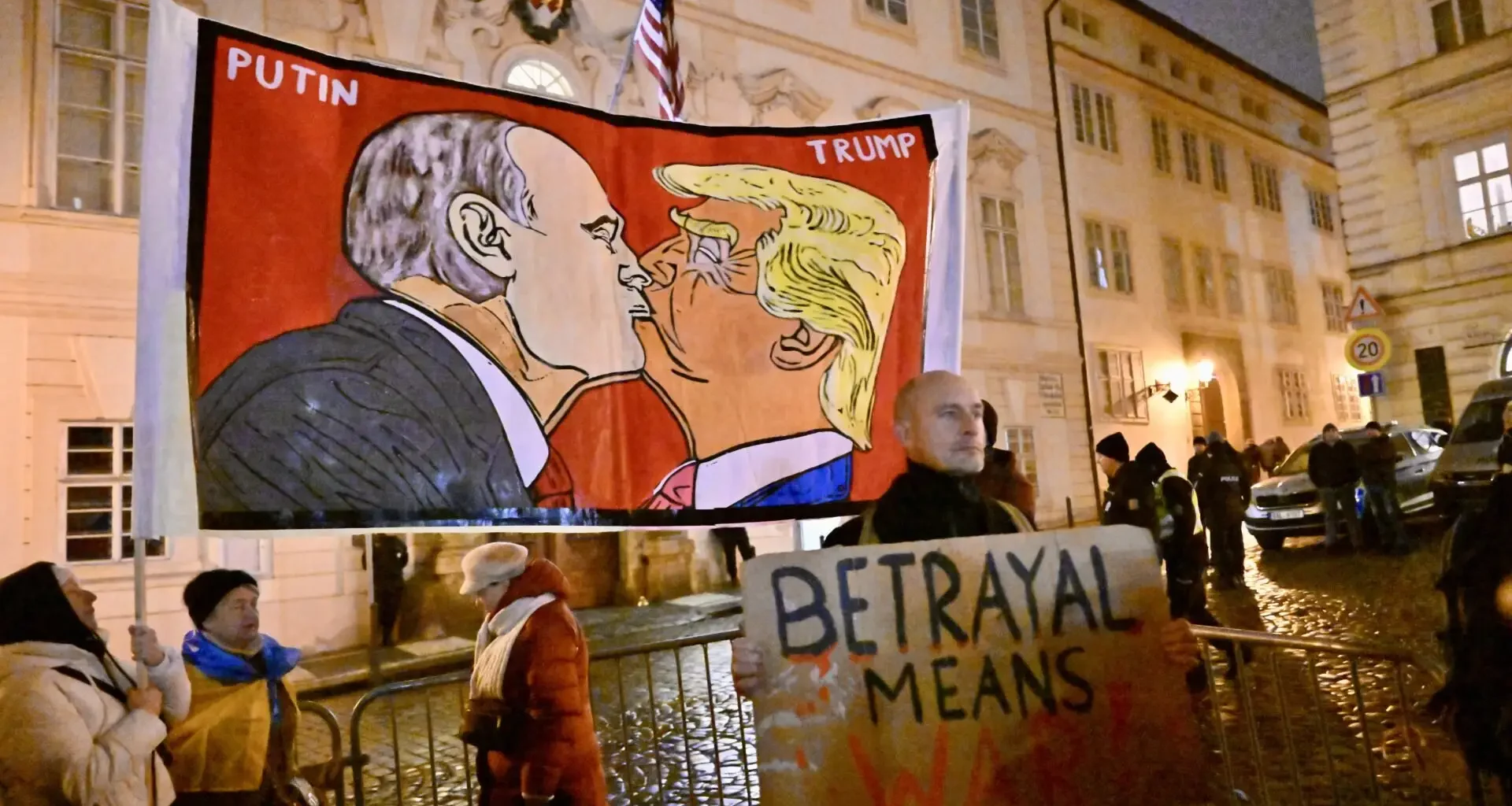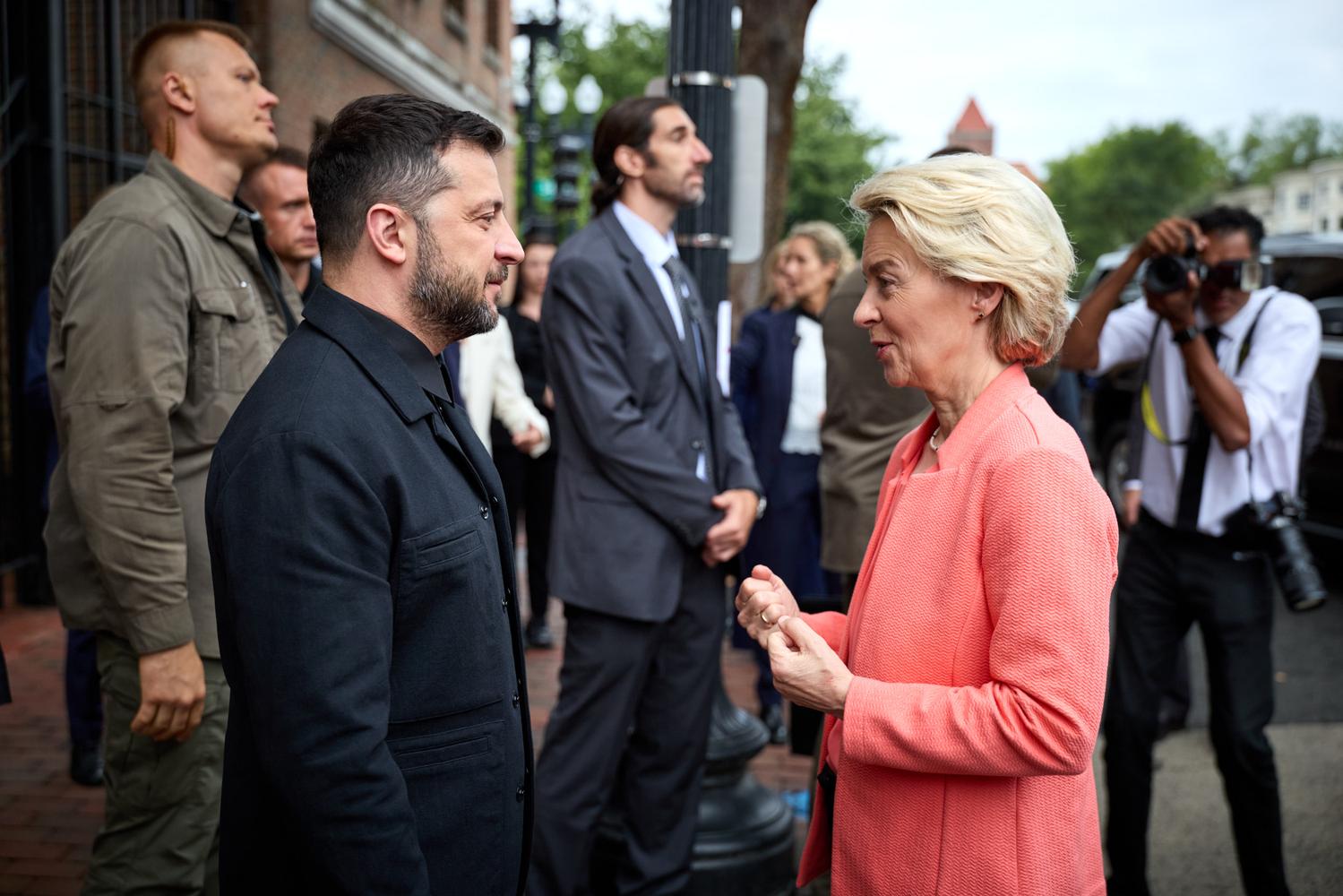The Trump administration accepted a 28-point "peace plan" for Ukraine that Russia itself had written—then defended it as an American proposal. When the uproar forced revisions, leaked recordings revealed the president's personal envoy had been coaching Kremlin officials on how to manipulate Trump.
This is not hardball diplomacy. This is a broken policy process producing outcomes that echo Munich 1938.
Russia writes America's peace plan
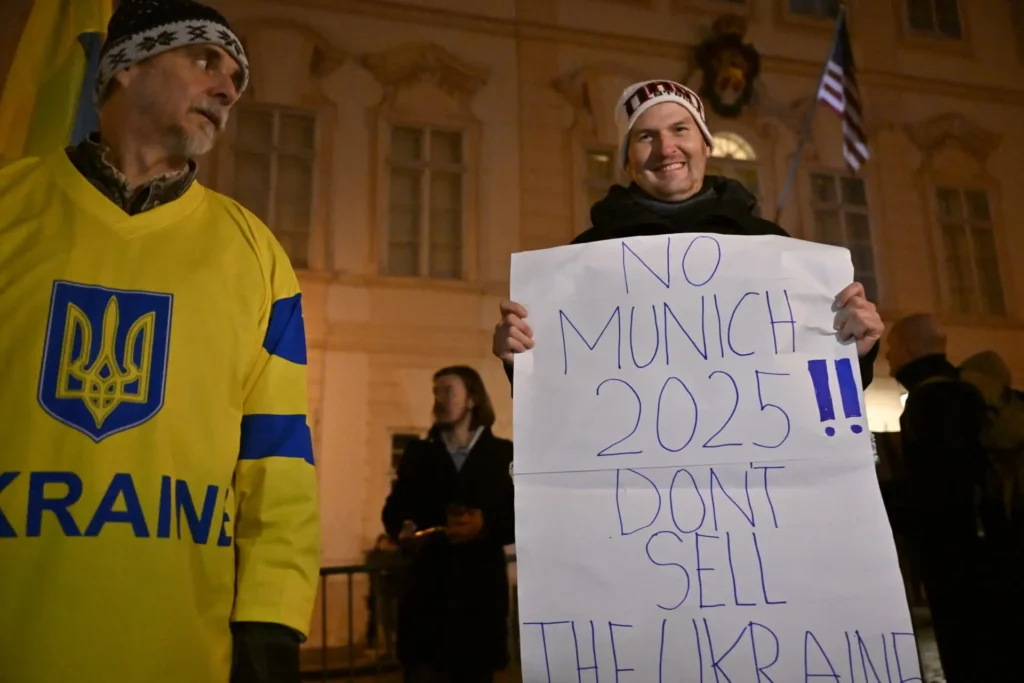
In the aftermath of the Anchorage summit, as Moscow now admits, the Russian government wrote a 28-point peace plan that it submitted to Trump's personal ambassador, Steven Witkoff. This document was then translated into English, but betrays its Russian origin. It was then leaked to the public, provoking an uproar in Congress, among European governments, and Ukraine.
This uproar was justified because this document is egregiously one-sided for Russia's benefit and in many ways resembles the Munich Accords of 1938.
Although this reaction forced Secretary of State Rubio to renegotiate this plan with Ukraine and European allies, leading to a new, more equitable, and pro-Ukrainian 19-point plan, its initial acceptance as a peace plan reflects a slipshod, unprofessional, and ignorant approach to negotiating with Russia.
The Munich parallels
Like Munich, the original accord was negotiated over the heads of Ukraine and Europe and then presented as an ultimatum to Ukraine.
Like Munich, the original accord gives Russia Donbas territories it has not conquered, formally recognizes it and Crimea as Russian territory, and allows Russian occupation of Zaporizhzhia and Kherson. It limits Ukraine's army to 600,000, sets ridiculous limits on the weapons it can have or receive from the West, and bars Ukraine from NATO.
The new version caps Ukraine's army at 800,000, its present number, and leaves it to Ukraine and its interlocutors to negotiate territorial issues.
And again, like Munich, the original document imposes Muscovite restrictions and demands: an election within 100 days, an end to so-called Nazi propaganda (i.e., Ukrainian nationalist and pro-independence speech), and granting legal status to the Russian language and Russian Orthodox Church—hallowed instruments of Russification and empire.
Once again, the ignorance of US officials on these points manifested itself.
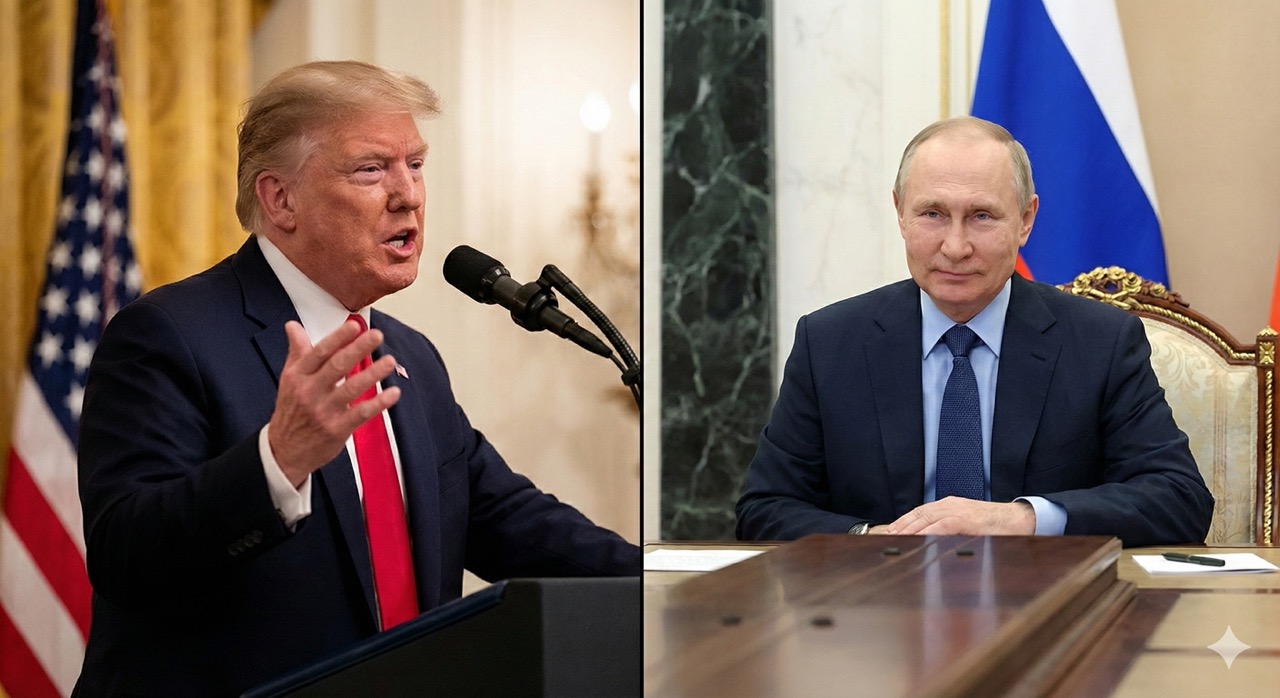
After three years of grinding losses, Trump’s plan gives Russia terms it couldn’t get in 2022
Rubio's forced reversal
Once the negative reaction came in from the G20, Europe, and Congress, Secretary of State Rubio told Senators that this was a leaked Russian draft wish list, not a US proposal.
The White House immediately pressured him to reverse course, forcing him to claim this was a US draft—an assertion that was promptly reasserted by President Trump, thus advertising his own incompetence, ignorance of the issues, and one-sided sympathy with Putin's position.
This whole affair highlights divisions in the White House and a broken policy process. Worse yet, and besides undermining confidence in Rubio, Trump, and US foreign policy generally, this document unilaterally destroys the sanctions regime that is crippling Russia's economy.

The sanctions giveaway
Specifically, the original plan states that "The United States will enter into a long-term economic cooperation agreement for mutual development in the areas of energy, natural resources, infrastructure, artificial intelligence, data centers, rare earth metal extraction projects in the Arctic, and other mutually beneficial corporate opportunities."
This clause reintegrates Russia into the global economy without mentioning restitution, reparations, or the return of kidnapped children.
Furthermore, since Russia has played this game in the 1920s and after 1991—offering its resources to the West only for investors to be disappointed—this point amounts to selling the same horse thrice. Fortunately, the new version omits this and other efforts to entice the administration into accepting Russia's goals.
The revised plan and Moscow's predictable rejection
While the new plan negotiated by Washington, major European powers, and Ukraine is much better and its original text is exhaustively reported in the world press, it still faces many hurdles.
First, it must obtain Moscow's assent since many elements here are unacceptable to Moscow. The new draft leaves territorial issues to be negotiated between Ukraine and Moscow, along with Washington.
Perhaps most offensive to Russia, the new draft openly discusses US-backed security guarantees for Ukraine that "mirror" Article V guarantees—i.e., guarantees resembling NATO membership. These guarantees evidently allow for the stationing of NATO members' forces in Ukraine, backed up by US aerial assets stationed in Poland, should Russia attack again.
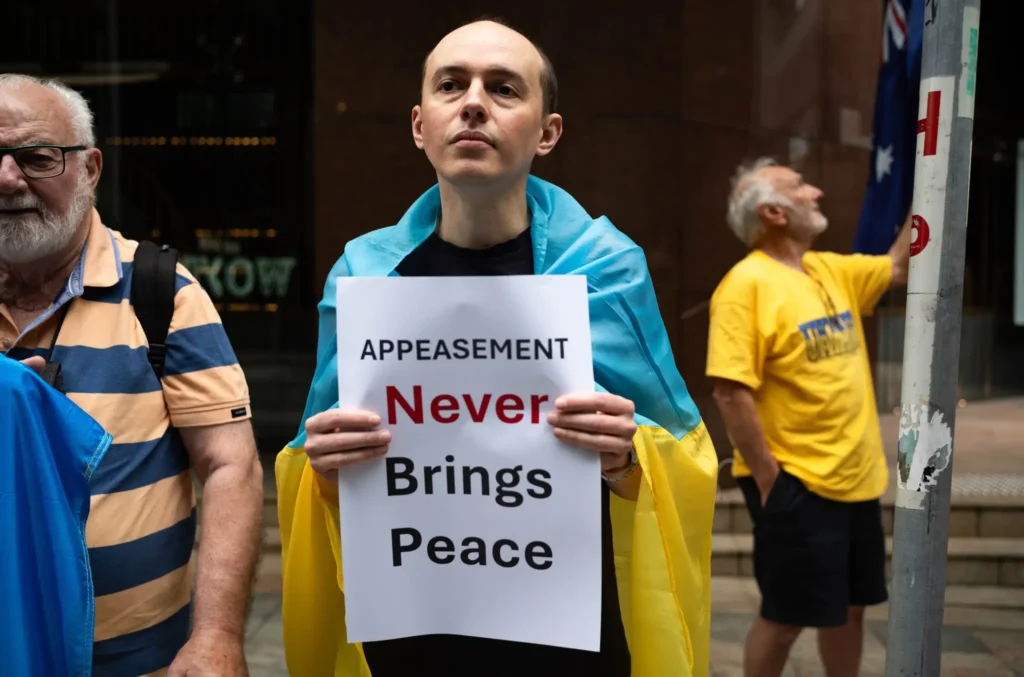
Moreover, according to President Zelensky's Chief of Staff, Andriy Yermak, "the new draft would make US security guarantees 'legally binding' and not contingent on Ukraine formally abandoning its constitutional commitment to eventually join NATO."
It also stipulates relief from sanctions on condition of an end to hostilities and jettisons the earlier draft's language about Russo-American economic ties. It revises the original draft to confirm Ukraine's future membership in the EU and reserves the contentious issue of NATO membership exclusively for Kyiv and Brussels.
All these points, along with revisions concerning alleged Nazi (i.e., pro-independence and Western) propaganda and the insidious role of the Russian Orthodox Church—which is an arm of the FSB—will also disappoint if not confound Putin.
Trending Now
Indeed, pending the formal submission of the new plan to Moscow, Russia's initial reactions are already negative.
Putin has stated that the original draft, authored by Russia, could serve as the basis for negotiation. But Russian spokesmen predictably complain that the revised version "doesn't fit us at all" or that it diverges from what was supposedly agreed to at the summit in Anchorage.
This is surprising, for it seemed that nothing was agreed to at Anchorage—another sign of unprofessional diplomacy.
Thus, Moscow remains wedded to the destruction of an independent Ukraine as its objective, believes it can win the war, and will not negotiate any terms offering it less than the fundamental revision of the post-Cold War settlement.

Therefore, we should expect Russia's obdurate opposition to the new draft and ongoing pre-negotiation efforts to modify it to its taste. That conforms to its habitual tactic of trying to make the document serving as the basis of negotiation a pro-Russian paper once formal discussions begin.
Obviously, failure to garner Russian assent means continued hostilities, and even if Russia agrees, given past practice in many wars of one or both sides fighting while talking, there is no guarantee of a genuinely supervised ceasefire in place.
Trump's disqualifying negotiators
In this context, President Trump's designation of negotiators to Kyiv and Moscow represents a warning signal. His emissary to Kyiv, Secretary of the Army Daniel Driscoll, is the college roommate of Vice-President Vance, the leader of the anti-European faction in the Administration.
On 21 November, when the Russian draft emerged and the White House insisted that it had authored this plan, Driscoll told European ambassadors and Western officials, "We are not negotiating details"—according to a senior European official in the meeting at the Kyiv residence of US chargé d'affaires Julie Davis. A top European official described the tone of the meeting as "nauseating."
Driscoll further said that "The US Armed Forces love Ukraine and stand behind Ukraine, but it is the honest US military assessment that Ukraine is in a very bad position and now is the best time for peace."
Witkoff: coaching the Kremlin on how to play Trump
However disturbing this is, sending Witkoff—who has long since proven himself to be utterly uncomprehending of Moscow's tactics, objectives, and games—is even worse. This is especially true now that his 14 October conversation with Putin's representative Yuri Ushakov, and another conversation between Ushakov and Kremlin negotiator Kirill Dmitriev, has been leaked.
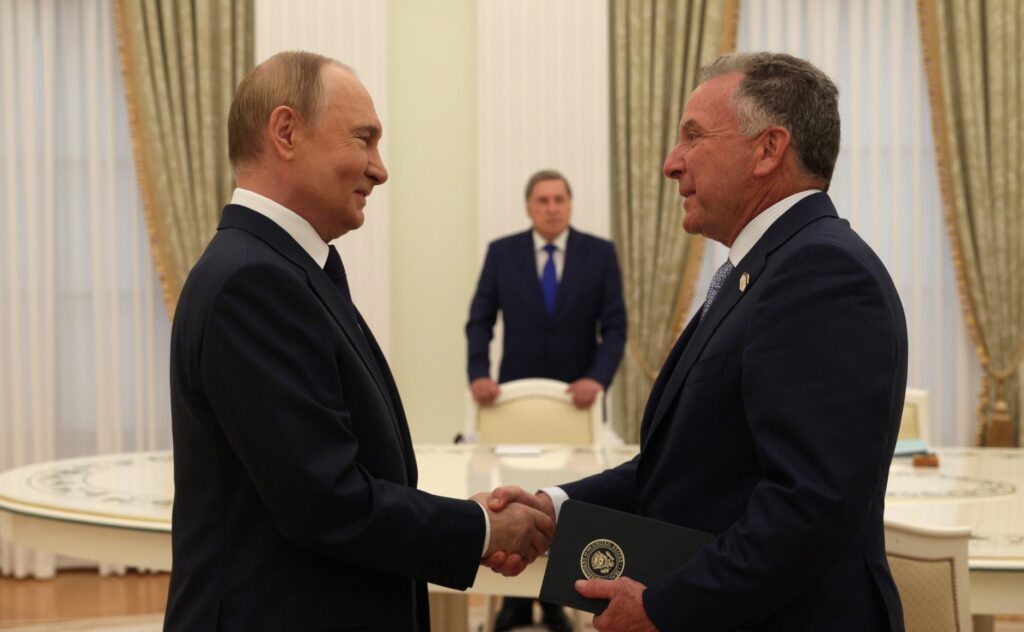
In these calls, Witkoff said he believed the land concessions were necessary while advising Ushakov to congratulate Trump and frame discussions more optimistically.
"Now, me to you, I know what it's going to take to get a peace deal done: Donetsk and maybe a land swap somewhere," Witkoff told Ushakov during the five-minute conversation. "But I'm saying instead of talking like that, let's talk more hopefully because I think we're going to get to a deal here."
Witkoff also offered tactical guidance on how Putin should raise the subject with Trump, including suggestions about scheduling a Trump-Putin telephone conversation before Volodymyr Zelensky's White House visit later that week. Compounding this disaster, Trump brushed aside this scandal as standard diplomatic practice—another untruth that has now triggered another uproar in Congress because this is another shocking example of ignorance and incompetence.
Obviously, the policy and personal divisions impeding a competent policy process have not been addressed, as this episode shows.
Systemic ignorance
Unfortunately, this ignorance and incompetence pervade the Administration. In earlier conversations with Hungarian President Viktor Orbán, Trump was persuaded by his argument that Hungary needed an exemption from sanctions on Russian oil and gas, as Hungary is landlocked and has no alternative but to continue buying it.
The Czech Republic is also landlocked. It joined the sanctions without demur.
Neither is there a genuine policy process regarding Europe or Ukraine. As of June 2025, due to layoffs at the National Security Council, nobody there was working on Europe, according to a former high-ranking Pentagon official in communication with the author.
The one silver lining
Thus, it is amateur hour at the White House as Ukraine approaches its most fateful hour.
Perhaps the only redeeming feature of this fiasco is that Trump's incompetence has forced Europe to stand up. This fact, coupled with Ukraine's determination, may yet integrate Ukraine with Europe and vice versa in their mutual defense of both Europe and democracy.

